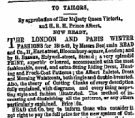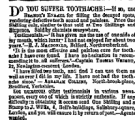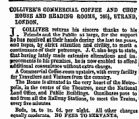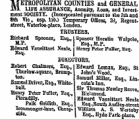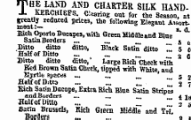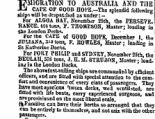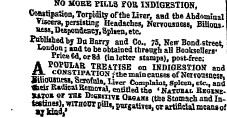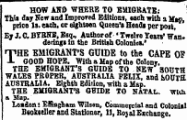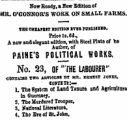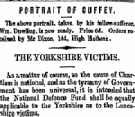On this page
- Departments (2)
- Adverts (13)
-
Text (6)
-

THE NORTHERN STAR , SATURDAY, NOVEMBER 25 ,18*8.
-

Untitled Article
-

Untitled Article
-

Untitled Article
-

Untitled Article
-

HEALTH AND ECONOMY.
Note: This text has been automatically extracted via Optical Character Recognition (OCR) software. The text has not been manually corrected and should not be relied on to be an accurate representation of the item.
-
-
Transcript
-
Note: This text has been automatically extracted via Optical Character Recognition (OCR) software. The text has not been manually corrected and should not be relied on to be an accurate representation of the item.
Additionally, when viewing full transcripts, extracted text may not be in the same order as the original document.
Untitled Ad
H ^ HOMAS MARTIN WHEELER , of OCon-1 nortille , « ear Rickm « . worth , ^! ««*« £ boarders two boys , from the age of tern to fo **?^?™* attentioniriUb / paia to their p hync ^^^ jHa . Ttnce . £ le « Knnnic « t : on » to contain a fw ^ s e t « np , * 53 Ca MUB-ACRB SHABB in Rational land Company , to be diiposed ot Price , rf « Mf .
Untitled Ad
. 10 BE BISfOSBD OF , A FOUR-ACRE PAID-UP SHARE for £ t * s ; aUo , a TWO-ACRB PAID-UP SHARK f A ^ lc ^ oiii to be made to T . Av 144 , High Holfcoro , london .
Untitled Ad
TO TAILOaS . By approbation of Her Majesty Queen Victoria , and H . S . H . Prince Albert . KOW BEADT , rpHE LONDON AND PABIS WINTER X FASHIOHSfor 1848 . 19 , by Messrs Benjamin BEAD and Co ., lS . Eartstreet . Bloomsbuty-sqnare , London ; ana bj 6 . B » ew , Holywell-street , Strand ; a very splendid PBINT , snperbly Cf loured , accompanied with the most fashionable , novel , and extra-fittiag Riding Dress , Hunting and Ftock-Coat Patterns ; the Albert Paletot . Drees ana Morning Waistcoats , both single and double-breasted . Also , the theory of Cutting ; Cloaks of erery description fully explained , with diagrams , and every thing respeitjnzstjle and fashion iUustrated . The method ofinoreasriig and diminishing all the patterns , or any other * Mrticinarly explained . Price 10 a . BEAD aniCo . beg to inform those wlio consider It not rieht to fay the full price for the new system of Cut . that
Untitled Ad
DO YOU SUFFER TOOTHACHE ? -lf so , use Biakde ' b EsajIei . for filling the decayed spots , rendering defective teeth sound and painless . Price One Sbaiiag only , similar to that sold at Two Shillings and Sixpence . Sold by chemists everywhere . . Testimonials . — ' It has given me the me of one side oi my mautb , which loxur' I had not enjoyed for about two year * . '—B . J . if acdonaid , Belford , Northumberland . It is the most effective and painless cure for toothache I have ever found . I have no hesitation in recomi&endingitto . aU sufferers . '—Captain Thohis Wannr , 12 , Nenington-crescent ,-LoBdon . < I have filled two teeth , and find I can use . them as veil as ever I did in my life . I have not had the toothache since . ' — Abbibak Coilihs , North-brook-place , Bradford . Yorkshire . See tunaerau other , te&timomak in various newspapers , ever ; one of which is strictlj authentic . If any difficulty in obtaining it occurs send One Shilling and a Stamp to J . Willis , 4 , BeU ' e-buUdings , Salisbury . sqnare , London , and you will ensure it by return of pest . —Agents wanted .
Untitled Ad
COLLIVER'S COMMERCIAL COFFEE AND CHOP H 0 DS 6 AND BEADING R 00 U 3 , 2665 , STRAND , LOKDON . J C 0 LLI 7 ER returns Ms sincere thanks to his Friends and the Public at large , for the support be nas received tt their hands during the last ten years , and iiopes , by strict attention ant civility , to merit a continuance of tiieir patronage . J . C . also begs to State , that having lately made extensive alterations and improvements in hb premises , he is now enabled to afford additional convenience without extra charge . A Commercial Coffee-room upstairs , with every facility for Travellers and Visitors from the country . The House is situated iu the very heart of the Metropolis , in the centre of the Theatres , near the National Land Office , and Public Buildings . Omnibuses pass to and from all the Railway Stations , to meet the Trains , every five minutes Beds , w . to is . 6 d . per night All other charges eonally moderate . NO FEES TO SERVANTS ,
Untitled Ad
METROPOLITAN COUNTIES and GENERAL LIFE ASSURANCE , Annuity , Xoaa , and Investment SOCIEXr . ( Incorporated pursuant to tbe 7 th and 8 ft Yic , cap . lio . ) Temporary Offices , 3 J , Begent-Etreet , Waterloo-place , London . TRUSTEES . Bichard Spooner , Esq ., 1 Spencer Horatio "Walpole , H-P- I Esq ., M . P . ' £ dward Vansittatt Xeale , j Henry Peter Fuller , Esq . Esq . j DIRECTORS . Bobert Chalmers , Esq ., Edward Lomax . Esa :, St Thurlos-square , Bromp . John ' s Wood . _ * ° ' Samuel Uiller , Esq ., Lin . SamuelDriv £ r , Esq ., 'White- coin ' s Inn . T , ha 11 ' „ - » „ „ Sir Thomas Newley Reeve , Henry Peter FuSer , Esq ., Richmond . Piccadilly . Edward Vansittart Neale Palk Griffith , Esq ., Esq ., Soutti Audlej-street Iroumoager-lane , Cheap- "William A . S . Weftoby «« e . Esq ., H yde Park-place .
Untitled Ad
T ^ pS /* cha RTER SILK HANDKERCHIEFS . Clearing out for tbe Season , at greatly reduced prices , the following Elegant A « ortment : — s d . Bich Oporto Ducapes , with Green Middle and Blue Satin Borders ... ... .. 5 (| . Ditto ditto auto , Black Satin ditto ' . " . " 5 o Half of Ditto ... ... ... ' ^ 5 Bitto aitto aitto , ' Large Rich Check wiVh Bed Brown Satin Check , tipped with White , and llyrtle spaces ... ... 5 9 Half of Ditto ... ... ¦;; " 27 Kich Satin Ducape , Extra Rich Blue Satin Stripes oadBorders ... ... 4 1 u Halfof Ditto 1 ' '" *" Satin Brussels , Kich Giecn Middle and Tri , Borders ... . autucra ... j
Untitled Ad
T 7111 GRAT 10 N TO AUSTRALIA AND THE -Li CAPE OF GOOD HOPE . —The splendid following shipi will t > e ilcspatdied as under : — For ALG 0 A BAY , November 25 th , tbe PERSEVE-• $ UKCE . iC 6 ton * , li . THOMPSON , Master ; loading in tile London Docks . For the CAPE of GOOD HOPE , December 1 , fte J 0 MaSA . 5 fatt . n 3 , F . BOWLES , Master ; loading in StKatherine Docks . For POUT PBILIP and SYDNEY , November 25 tb , the BEOLAII , 57 S tons , J . H . M . STRU 30 S , Master ; loadin ; ia the London Docks . The abovsfast-sailiog sbips aie commanded b y efficient officers , and are fitted with special attention to the comfor t and convenience of every class of passengers . They have most spacious ' tweea decks , we ; l ventilated , are fitted with life boats , carry experienced surgeons , amd araprovisioaei on the most liberal scale . fiFarailiis can have their berths so arranged that they can be entirely to tiiciuselves , and not aix with the other passengers .
Untitled Ad
SO HOBB PILLS TOE INDIGESTION , Constipation , Torpidity of the Liver , and the Abdominal viscera , persisting Headaches , Nervousness , Bilious .. sess , Despondency , Spleen , etc Published by Da Barry and Co ., 75 , Kew Bond-street , London ; and to be obtained through all Booksellers * Price Gd , or 8 d ( in letter stamps ) , post-free ; A ^ SUShlP TREATISE on INDIGESTION and SUunUueu , Scrofula , LWer Complaint , Spleen , etc ,, and fceuRadicMRemoval , enfiBedthe 'iLrWBbqme-^ 5 uS& ^ OTfl 0 BT pUl 8 » 5 ur S atiTW . orartincialmeansof
Untitled Ad
* HOW AND WHERE TO EMIGRATE ; This day Heir and Improved Editions , sach with a M * p , price Is . each , or eighteen Queen ' s Heads per post , By J . C . BYRNB , Esq ., Author of Twelve Years' Wan . derings in the British Colonies . ' THE EMIGRANT'S GUIDE to the CAPE OF GOOD HOPE . With a Map of the Colony . THE EMIGRANT ' S GUIDE TO NEW SOUTH WALES PROPER , AUSTRALIA FELIX , and SiOUTE AUSTRALIA . Eighth Edition , with a Map . THE EMIGRANT'S GHIDE TO NATAL . WA a Map . Loiion : Efiagnam Wilsen , Commercial and Colonial Bsokieller and Stationer , 11 , Rojal Exchange .
Untitled Ad
This day is published , price la . POPULAR THEOLOGY tested by MODERN SCIENCE , in a series of Letters to a Friend . By a Well Wisher to 8 ociety . London : John Chapman , 143 , Strand .
Untitled Ad
Now Ready , a New Edition of MR . O'CONNOR'S WORK ON SMALL FARMS . IHE CflUrlST BDITION XTBS PUBHSHTO . Price Is . 61 ., A new and elegant edition , with Steel Plate of be Author , of PAINE'S POLITICAL WORKS . No . 23 , OF "THE LABOURER " cosiiiaa two tsneva by hb . bssest jokes , comets : — 1 . Tbe Sjtttm of Land Tenure and Agriculture In Gutrncey . 2 . The Murdered Trooper . 3 . Katiooa ! Literature . 4 . The Ere of St . John .
Untitled Ad
PORTRAITJ / CUFFEV . The abore portrait , taken by his fellovr-sofferer , Wm . Dowling , is now ready . Price 6 d . Orders recened by Mi Bixon , 144 , High Ho \ bo « n . < m THE YORKSHIRE VICTIMS . &S amattet of course , as the cause of Chartism is national , and as the tyranny of Government has been universal , it is intended that the National Defence Fund shall be equally applicable to the Yorkshire as to the Lancashire victims .
The Northern Star , Saturday, November 25 ,18*8.
THE NORTHERN STAR , SATURDAY , NOVEMBER 25 , 18 * 8 .
Untitled Article
IRELAND . THE LABOUR QUESTION . "Alai ! pooroou » try . Almost afraid to kaow ilielf . " Was ever country in such a condition as unhappy Ireland ? Her landlords bankrupther farmers flying—her labourers dying—her shopkeepers starving—while her lands , the
most fertile in the world , remain sterile and unproductive , wltk W Government pledged to Free Trade , and boasting of its politics economical knowledge , hoping to rule by the sword , and the terror of perverted law—and the Press of this Government now rejoicing in the anticipated prospects of Poor Laws and the transfer of land from the bankrupt lord to the Jew mortgagee .
When will the monied classes and the labour classes of England seethe double burden and loss that Irish poverty imposes upon them ? When will the one be tired of making charity a substitute for justice ? and when will the other be tired of seeing Irish poverty constituting the standard of wages in the En ^ Ush labour market ? And , alas i when Will the dU recting and controlling mind of Ireland be won to the comfort of her people and the regeneration of their nationality ? Ireland has tried many physical revolutions for the acquirement of her rights—many a time and oft
has her moral genius been mustered in the Hall—in the Market Place—and on the sward , rendered holy by the blood of her sons spilt in the vain attempt to regain her liberties . How often has the genius in the Hall , the national fervour in the Market Place , and the numerical strength in the fields been pompously referred to as the sure means of achieving nationality ? But wbaVhas the muster-roll of Irish greatness ever effected in the Senate House , beyond the acquisition ^ power and patronage for the promoters of discontent , and the vain boastera oflreland ' s capability of achieving her own nationality ?
Are we to be told that the Irish representatives in the Saxon Parliament have never commanded sufficient strength since Catholics became eli gible to sit in the House , and the Reform Bill gave them constituents , with the whole national strength at their back , to resist a bad measure or insure a single good one ? And yet , after nineteen years incessant agitation ( we date from the period of Catholic emancipation ) will the most critical scrutineer point out one single clause in one single Act calculated to confer one single benefit upon the Irish people ?
The mind of Ireland had been impiously trained to place its whole reliaace upon incessant agitation , until at length the . more enthusiastic of her sons , discouraged and disgusted b yjtraffic iu her enthusiasm , have been driven into a course—a dangerous course—but the only one left open , to stir up the old cesspool of corruption . The danger to these young men , who saw the giant monster of fraud against which they had to contend—the old lessons which they had to unteach—and the old prejudices which they had to overcome , was not unforeseen by us . In yol . I . of the " Labourer , " ( page 269 , ) in a letter addressed l ° ^' i " Hussell , under the head
^ , THE PHASE OF POLITICAL PARTIES , will be found the following passage : " Tail must be aware my lord , that Irtland it rnw In reality , jour ( treat difficulty-sou mmtSEtattffiiit any arty will XOW be aofe to rou . e a confSeoJte to madness , tosecure a national r epresentation upon » national principle , with no other view , and no bettor purpose than to secure patronaRe " out of confidence louwillnot again Bee KEPEAL PLEDGLIKGS con Tertea into Whig tools by the simple process of patronage . You recollect the Terj equivocal comulimentTiBi
to Mr O'Connell by Charle 3 Bailer , when be assured the HOUSS that'Ireland-tobin a perpetual state « f incipient revolution , which was only checked by tho policy or her leader , and which no other living man could reBtrain after his departure . ' The danger from Ireland now is , the fervour with which contending PATRIOTS will bid for popular support ; and hatred to England , and stil more to Whigsery , will be the PATRIOTS' engine of power . My lord , until a fatal ascendancy is again acquired by an Irish party worth ministerial purchase , you will find Ireland a GREATER DIFFICULTY than she has yet been . "
From the words , "the danger from Ireland now is the fervour with which contending PATRIOTS will bid for popular support , " the reader will at once learn that we did not make a miscalculation of those dangers with which the path of the enthusiastic would Ue beset , when his task was the unteaching of old prejudices . But still the Ministerial difficulty remains , notwithstanding the temporary Minis * terial triumph ; and during our long life of agitation—if all our other works vanish into airthe very fact of having united the English and Irish popular mind in the pursuit of substantial and national improvement , instead of allowing it to be hurried away in the pursuit of " splendid phantoms / ' more than rewards us for all our other failures . I For years Irish agitation was based , not upon English misrule , but upon Saxoa hatted : not
Untitled Article
^ ^ ^ Va ^ M ^ HMi ^ H ^ BMM ^^ nMBi ^ HMMi upon the injustice of the English Minister , but upon the Anti-Irish prejudices of the Saxon people : and hence this Irish force of Saxon hatred and malignity , was ever the best arrow in the Minister ' s quiver—the best card in his hand . When an English difficulty arose , Irish tranquillity was secured through a promise of patronage , and Ireland was relied upon as tbe I 686 JV 6 force to 8 \ mmm 6 S 8 English agitation . , _ . „ n , _^_
Well , having witnessed these scenes for years , and the real leaders of the Irish people —the priesthood—having now discovered that poverty produces an empty Exchequer , the English Minister , as he had taken advantage of physical suffering , hoped to turn religious despair to his own purpose ; but in this last resource he has , thank God , failed , as the Irish priests Lave nobly told him , that they prefer sharing destitution with their flock to selling them to their Saxon rulers .
Having thus taken the right step in the march of progression ; and every man in Europe entertaining the conviction that the Irish priesthood does possess sufficient power to redeem their country from heggary and starvation , without shedding a drop of human blood , or without the violation of a single law ; the onerous , the honourable , the national , the sacred duty of regenerating their country is
now imposed upon the descendants of those shepherds who maintained their religion through scenes of blood and persecution , and who came forth from . their caverns and their hiding places , in nakedness and want , to preach their adopted religion in defiance of the force of the monster , who , to justify his own lust and adultery , would have converted them to his "TRUE FAITH . "
When men have power to remove misery , starvation , and discontent , by substituting happiness , contentment , and peace , the continuance of those intolerable evils are chargeable upon those who have the power , but lack the will to destroy them . Jt is worse than nonsense to talk of the inability or disinclina tion of the Irish people to support themselves in affluence npon the land of their birth , if the opportunity was afforded them .
In the good old days of corruption , the Ir ish land was valued by the political , and not by the a gricultural , standard . The Ministerial Member for the County possessed all the Government patronage , and from this great reservoir of corruption it flowed into Its varied channels . The Excise , the Customs , the Church , the Army , and the Navy patronage , were all at the disposal of the Ministerial
Member . He nominated the Sheriff ; the Sher iff elected , or rather invited , the Grand Jury ; and through this channel all the minor patronage of road-making , bridge-making , prison-building , Foundling Hospital building , police appointmeats , harbour and river appointments , and all minor appointments , passed to the local supporters of the Ministerial hack .
Hence we could cite instances of Countyrates in one county amounting to nearly 200 , 000 / . in the year , granted by the Grand Jury for bridges , of which a stone has never been laid ; for roads , which have never been opened—while we could cite numerous instances of clergymen , who were prime political agitators , when agitation was a good feather in the Minister ' s wing , having frem 1 . 000 ? , to
2 , 000 / , a-year in tithes , and making from 1 , 000 * . to 2 , 0001 . a . year by road-jobbing . The practice with these pious Macadamisers was , as a matter of charity , to employ the ablebodied labourers , in the dull season of winter , at fivepence per day , and then not expending , upon the work to be performed , five per cent , of the amount granted , But who was to bring them to account > THE 1 H PATRON .
Then there was what was called Tithe Auc tions , where a day was set apart for putting up for sale the crops of the farmer and the widow , when tithes were payable in kind ; and it was the practice of the parson of the parish not to allow those auctions to commence until the Proctor announced ,. that the attendants WERE BRAVELY SOFTENED—which meant drunk with porter and whiskey , furnished by his reverence . And , if the farmer thought the bidding was too hi » h for his tithe , it was knocked down to a Protestant yeoman , dressed in his red jacket ,
as a badge of supremacy and distinction ; and many a time and oft , we have witnessQd the blasphemous and disgusting scene of this privileged red-coat digging every tenth rod of the poor widow ' s potatoes , which she had manured with grass picked from the roadside , and the droppings of cattle gathered from the fields . "Well , then , let the British Minister hug himself as he may , with the hope of governing Ireland by the enlightened philosophy of the age , andlaudlord nostrums , we tell him that these bitter insults are the very foundation of
Irish hostility to British misrule , that they constitute the Irish character , and . lhat hence an Irishman will cheerfully assist his bitterest enemy in resisting the English law . If a parson , in the olden time , had distrained a Catholic ' s crops for tithe , and if that parson was threatened with any process of English law , the love of resistance , based upon persecution , would at once convert the Protestant ' s Catho * lie enemy into an anti-Saxon friend . And yet , in this age of progression , our rulers can hit upon no means for destroying this long cherished animosity . Not so , however , when the pastors of their own State Church complain even of inconvenience . Oh , no ; the first act suggests the remedy—and hence , when
under the old system of taking tithe in kind , too many farmers took advantage of the fine weather to carry their harvests , his Reverence found it inconvenient to obey the several simultaneous summonses , HE applied to Parliament through his Patron , and , as if by magic , an Act was . passed making it conspi racy for more than three to serve bis Reverence with notice to take his tithe in kind upon the same day . Thus , if there were a hundred farmers in a parish , the carrying time should he spread over thirty-three days of doubtful season , and hence the farmers , trampled ujwn by the law , were compelled to pay his Reverence in cash whatever amount he demanded a-5 an equivalent for tithes .
Wasjnot this « one law for the rich and another for the poor ? " And does not this fact clearly prove , that any inconvenience complained of by the rich may be remedied b y the law ' s magic , while genius <; an invent no correction for the injustice suffered by the poor Oh ! but says the Political Economist , the Irish peasant is better off than his ancestor who lived on roots and nestled half naked in a cave . So he is ; and his Monarch is better off then when her ancestor sat upon » wooden chair , reclined upon rushes , and lived frugally » n a palace that would now be condemned as unfit for her horses—nay , not a health y kennel
ihis change is . based upon progression and our answer to the economical apologist is th-it under the old system one-eighth of the LvZ lation never before perished of want in a sini year , nor did a sixteenth of the population ever abandon their . fatherland , ] eave their friends and relatives , and brave the dimffen of the deep to seek an asylum in a forei-n Infill * r * But why , says the Economist , talk about existing abuses without propounding a remedy » We do propound the remedy , As you make laws to coerce the people into the commission of wrong , make laws to coerce the landlords to the commission of tight ; make laws to compel the landlords to give leases in perpetuitv ¦»»
corn rent ; make laws—m the words of Sharman Crawford— " to make the owner of the land , and the cultivator or the soil part-proprietors , and Ireland will cease to be your difficulty ; your shipping will he too scant to bring the expatriated Irish back t o their homes —you will hear no more ^ of Irish rebellion sedition , or treason ; their place will be sub ' plied by Irish industry , contentment , and peace . "
Untitled Article
KING CONSTABLE . That there k " but a step between the ridiculous and sublime , " was a stereotyped quotation of THE NAPOLEON ; and if he could now look from the shades , and see the preparations for the election of his successor , he would behold the most ludicrous realisation of his cherished proverb . He would see the English special constable of A pril last , who was then armed , not to resist anticipated violence , but to cow public opinion—an opinion that sought to establish right , not by brute force , but through the expression of united mind ; an opinion from which was to spring the anticipated , but not the realised , results
of the French Constitution an opinion which was not directed against the stability of the throne , bat against the dangers by which it 19 surrounded ; an opinion which sought not the destruction , but the renovation , of the veritable British 5 Constitution ; an opinion which promised sustenance from Labour , and not luxury in idleness ; an opinion which was not the bubble of theoretically excited enthusiasts , but the adopted conviction of thoughtful and reasoning men : he would see this RIDICULOUS phantom of excitement ready to accept the SUBLIME position of Napoleon the Second .
Were it possible for thejfollies of one nation to be established as the standard of the intellect of another , we should be inclined to say , — "Perish , for ever perish—that hydraheaded monster , Universal Suffrage , if the united mind of a civilised nation is capable of accepting 6 uch a governor—such a monitorand such a fop ! " But we fall back upon our cherished proverb , and look upon it as the nation ' s protector , that
" THEPEOPLE ARE SELDOM WRONG , AND NEVER LONG WRONG . " Every act of cruelty—every act of rigour , of imbecility and barbarity , that has ; , been committed throughout the sanguinary revolutions that have so long raged . land are still raging upon the Continent , has beenjexultingly paraded by the Press , and used as a scarecrow to affright the timid , assuring its readers that the very same results would follow were Chartism the law of the land .
From the commencement of the French Revolution—nay , from the commencement of our political caieer—we have shown , that a sound constitution can be only based upon free discussion—upon open and advised speaking ; and if the first important act under the French Constitution should prove a failure and a folly , the result will be chargeable , not upon the weakness of the untutored mind of YOUNG FRANCE , but upon the tyranny of its rulers , who substituted brute force for public opinion , and stepped the current of thought until long pent up rage butist the barriers of corruption , and overwhelmed the reservoir of ignorance ,
We have told the working classes of England , that if they had established their Chartist principles in 1832 , before the mind of England was fully instructed in the value of those priuciples , and trained and disciplined in the proper use to be made of them , that we would have considered the Charter as a curse , rather than a blessing . We have resisted that bit-by-bit system of Reform , whicn was but intended to lure the mind from the pursuit of
the great prize , because the acceptance of any , the most modified , measure by the people ; when it fails , and when the people demand move , is urged as proof of the instability of popular opinion ; and , therefore , our principal object has ever been to direct the whole thought of the Empire to the whole question of Reform , and the accomplishment of which can alone realise even the progressive improvements , so pompously tendered as a sub-Btitute for the PEOPLE'S CHARTER .
We have also contended against that principle of electing a President , which must ever tend to the derangement of society , the division of the empire into factions , and a continued struggle for individual pre-eminence instead of national ascendancy ; and , therefore , whether the head of the state be Monarch or President , we have contended for the election of that head for life , with a power in the body greater than the head which it has elected , and capable of deposing it upon just cause ; in fact , we care not who is upon the throne , provided the power behind the throne , and which establishes and maintains the dignity of the throne , is greater than the throne itself .
A President elected for life , whose tenure of office depends upon his constitutional and impartial exercise of power , consults the national will , and not party caprice ; while the President elected for a ' short period weighs parties , balances their respective strength , panders to the prejudices of the strong , and canvasses numerical strength upon the accep . tance of numerical caprice , as his fitness for office . Hence we find America at the present moment divided into the most rabid factions , the bead of each not consulting public opinion —not consulting what line of policy would be best suited to the state , and calculated to insure its prosperity—but meanly cringing ' . tojthe prevailing fanatacism .
In our own Movement , we have always contended for the election of the Executive body by the Delegates of the people in Convention assembled , with a power vested in the people to depose the Executive , but not to re-elect their successors . We have adopted this principle . upon the basis of justice , and of prudence . Firstly . —The office entitles the officer to payj and the several candidates canvas in their several districts , basing their fitness upon the most rabid folly ; and being paramount in their own localities , no opponent dares to dispute their qualification , and hence no judgment can be formed of fitness by comparison .
Secondly . —When officers are elected at the close of a sittings of Convention , they are selected for the business habits and talents they may have exhibited in the transaction of business . The representatives who elect them are presumed to be the representatives of the people , and therefore the power of selecting their officers may be safely delegated to them , thus protecting the Movement against district faction fights , in which the seeds of deep-laid animosity are sown , " and securing men of the most business habits and for whose capability , integrity , and prudence , the delegates are responsible to their constituents . Nothing so much tended to the weakening of the Chartist cause in 1842 , and the Lancashire trials of 1843 , as the circumstance to
which we allude . The whole country waskept in a continuous scene of bustle by this system of canvassing , and it required no small time to allay the angry feelings that were thus created . It has been said of poets , that they are always Jnstable of mind , possessing but one idea , and incapable of performing any solid work . How truly this saying has been verified in the person of Lamnrtine , who based his constitution upon " Liberty , Equality , and Fraternity , ' sealed it with the " Kiss of Life " and with human
endorsed it blood . He was the God of the English Press , so long as his vacillating genius could be warped to English policy , but , like Charles Albert , when he failed he was a worn-out tool , and was thrown aside . This Lamartine says , " You are not omnipotent , the power of electing a president is not delegated to you ; one man may canvass his relatives in this Assembly , another may base his pretensions upon the promise of patronage , while another may attempt to establish his right upon the name be bears . "
This poet had not the solid brains to see that every one of these phantoms , which haunted him in the narrow chamber , would be magnified and multiplied into substantial monsters when the arena was extended to the limits of nationality . How many votes would the English Special Constable have had in the Assembly , where in . tellectand business habits would haveconstii tuted the qualification of the candidate ? How
Untitled Article
many will he not havejiow , when capacity is merged in name and when fitness constitutes no element in the selection ? And after this rabid display of favour , will not that partisanship , so dreaded by Lamartine in its narrow sphere , be equally exhibited iu its National phase . Will not the Prince Constable endea vour to maintain , by folly and bombast , a position which he will only have acquired through i
gnorance , false hope , and enthusiasm for a name ? Yea , verily ; and although the whole period , from February to December , had been expended in the establishment of the ' most unassailable and unquestionable constitution , the very act of placing Louis Napoleon at the head of that constitution would cause the fabric to crumble and fall , strong and permanent as it might have been with a proper head upon it .
We may be answered , that the Assembly , operated upon by its feats , would have elected Cavaignac , as the English Parliament , operated upon by its fears , not only tolerated , but supported , a Russell Cabinet ; but to this we answer , that Cavaignac might have been deprived of his supremacy by the power which elected the Assembly that conferred that supremacy upon him . France may now be on the look-out for the result of its own folly ; for its people may rest
assured that the election of the English Special Constable to the Presidency of the nation , will lead to a more bloody and sanguinary reyolution than France has yet witnessed , and then the folly will be charged upon the people by the bit-and-bit Reformers . Then the French failure will be flashed in the face of English Chartism , all chargeable upon popular indiscretion and madness ; while , in the other case , it would have been chargeable upon the weakness and want of judgment of the Asaem My , while p opular prudence would be relied upon as a corrective .
Untitled Article
THE NATIONAL LAND COMPANY . The proceedings of tbe late Conference of this body , and its decisions , were so important , and both immediatel y and remotely affected the interests of so large a portion of the industrial classes that we have delayed any comment upon them until we had fully mastered their scope and bearing , and carefull y calculated their probable results .
Perhaps no plan in modern times has been so violently assailed and denounced , or so hotly and zealousl y defended and supported , as that of the National Land Company . To some extent this makes it difficult to pass a dispassionate and perfectly impartial judgment upon the subject , because in an atmosphere of heated discussion it is impossible for any one entirel y to escape the pervading influence , or to be more or less biassed on one side or the other . For our own part , while we have never shared in the extreme anticipations of some of it
s more sanguine promoters , and have discerned in the distance numerous practical difficulties , both external and internal , we have , at the same time , clearly perceived the fal lacy—not to say falsehood—of the popular accusations against it , and of the ignorant and unthinking condemnation passed upon it by persons whose sole knowledge of its nature , constitution , and objects was derived from the columns of journal * , unscrupulously devoted to calumniate and misrepresent it . By these parties the Plan has never received a fair and candid examination upon its own
merits . It has , throughout , been associated with an extreme and an obnoxious political creed , and a political chief who has the fortune or the misfortune to be unpopular with all those who fatten upon labour , without , in any way , repaying the benefits they receive from the community at large . If from the very commencement a storm of misrepresentation had not thus been raised , and the Plan had been ' tried by practical tests , both as to its fundamental principles and leading objects , it would , we are certain , have been declared to be as sound in the first respect as it must be admitted to be benevolent in the second .
Despite the speculative and mischi evous theories of writers of books and pamphlets on Political Economy , the common practice and experience of all ' ages have shown that the soundest foundation for national wealth , prosperity , and contentment , is to be found in a wide diffusion ef landed property among the whole population , and the application of a preponderating amount of the labour of the country to the production of food and the raw materials of wealth . The neglect of this primary principle of sound national economy has mainly conduced to place this country in its
present miserable and perilous position . The people have been , to a great extent , divorced from the soil , and their energies directed into the precarious and fluctuating pursuits of manufactures and commerce . The land has , in the meanwhile , fallen into the possession of a very few families , and we may fairly say that the vast majority of the people are really and literally aliens in the land of their birth and recall the touching passage of Scripture , "The foxes have holes , and the birds of the air have nests , but the Son of Man hath not where to lay his head'' of his own .
To remedy this great evil—to restore the equilibrium to the State machine—to reconstitute society more in accordance with those great natural and equitable laws , which are the only foundation and guarantee of national well-being—the originators of the National Land Company proposed their plan . The immediate object was , no doubt , to give land to the landless , labour to the unemployed , and an independent command over the decent comforts of life to the poor , by the free exercise of honest industry—but , ' if carried out to the full extent which the principle may , and must be , it will necessarily produce the result we have stated .
That the machinery by which the object was sought to be attained , in tie first instance , was imperfect , and the calculations incorrect , may be readily admitted , without , in the slightest degree , invalidating its claims to public support . Where a plan is right in principle , and calculated to be beneficial in practice , these small details are of very minor importance , and such as increased experience is sure to give the means of rectifyingand of rectifying in the best and most effective
manner , Such appears to us to present briefly the abstract case of the Land Company . Now for its actual history . Like many other plans for the elevation of the working classes , it lingered for some time with but slight support . All at once , however , a mania—if we may so call it—seized upon tens of thousands of persons , who eagerly pressed forward to enrol themselves as shareholders . It was
repeatedly stated , before the Select Committee , that the sudden increase of business completely overwhelmed the Directors , and rendered it almost impossible to keep pace with it . It is evident , too , that this added heavily to the responsibilities laid upon them , and that if aw defects existed in the working machinery and minor details of the Company , it was sure to press heavil y upon them , and aggravate materially any injury they were , calculated to inflict .
The Directors , however , appear to have done their best to provide for this unexpected influx of shareholders , and Mr O'Connor warmed into enthusiasm by the rapiditv with which the shareholders increasedI and = the funds poured into the treasury , may be well excused for forgetting the fickleness of nubHc opinion and that it was possible tnetide wfth th ? n f , W » h » d « t in ssaSSs
wnerever possible , and a ^^ eT SSStaJ" Yi ' . ^ « H 2 £ with S ? n ° S COntinue t 0 «» PPly him wasnnL ^ f * t , at all events , there was not , and never has been , any reason for
Untitled Article
withholding them . What the Company , quired from its members—what it proposed u do- ~ the mode in which it was to be done— a a the practical operations in which Mr 0 'd nor was engaged , from week to week— 2 ' all published , and weekly submitted to tl gaze and the scrutiny of the whole countn ? His confidence , too , had this additi onal «?' mulus and justification—that , notvrithstand in a persevering and earnest attempt , on the Dal of systematic opponents of the Plan , to darnW it and him in public estimation , the week ? income of the Company augmented instead Ir diminishing , and votes of unbounded confidi ? in his integrit y and in the practicabili ty of the Plan , poured in from all quarters of tiT island . ine
Under such auspices , Mr O'Connor appli ea to Parliament for a Bill to legalise the ( W pany ; and immediately upon ascertaining that before such a Bill was granted a scrutiny ftf the Plan , and of the affairs of the Company was desired by . parties influential with the Go vernment , he atj , ' once moved for a Select Committee of the House of Commons to in . vestigate the whole matter . It is unnecessary for us to say more of tiiat investigation than this : that , after being conducted in a spirit most hostile and unfair to Mr O'Connor and the Company by the Chairman—a well-paid Government official—after its accounts had been subjected to a scrutiny altogether unua
ralleled m Parliamentary annals—th e Select Committee reported to the House in the moat laudatory terms of the honesty and good faith by which the whole of the transactions had been characterised-gave the lie to all the toul and dastardly charges made by the Press , and by individuals , against the personal ho ' nesty of Mr O'Connor , by showing that , besides the devotion of his time and money to the service of the Company , he had , in his his anxiety to ; forward its objects , actually advanced a large sum out of his own pocket to carry on its operations . The Committee pointed out the defects of the constitution of the Society , as tested by the existine law of th *
land with reference to Joint-Stock iCompanies and Lottery Acts , and most favourably recommended Parliament to give the shareholders the opportunity of amending the constitution in such a way as to obtain the sanction of the Never was a more signal triumph achieved but , strange to say , the people who , while the scheme was ' reviled and calumniated , sent iu their subscriptions at the rate ef thousands a week , no sooner found that the Company had passed substantiall y unscathed through thi 3 severe ordeal , than they began to droooffthe thousands dwindled into hundreds—the hundreds into tens—and they thus took th » most direct and certain method of proving the '' impracticability " of the plan , which had so long been prophesied by its enemies .
These sudden and unaccountable alterations of popular feeling are not uncommon , and must be submitted to by all who take part in public affairs ; nor is the National Land Company the only one now experiencing their injurious effect ? . There has been a still greater panic in the Railway Share Market . The shares of the most substantial and best established lines have been unsaleable at two-thirds and onehalf of their former prices . The Directors of
all the principal companies have been compelled to come forward at last , and give what Mr 0 Connor always has done—an open statement of the pecuniary and general position of their respective concerns ; and even with these en . forced financial accounts , and the postponement of every line for which Bills have been obtained , but not yet commenced , the market is still heavy , and a serious depreciation in that kind of property seems , for some time at least , to be probable .
fo return , however , to the history of the National Land Company . Upon receiving the triumphant verdict of acquittal from all the charges which had been brought against the pecuniary managemen t of the Company , and ascertaining precisely what the legal objections were to its constitution and its financial calculations , Mr O'Connor took prompt and decisive steps , in conjunction with the Directors , to remedy the defects so pointed out . After consulting practical and experienced persons , a draft of alterations to bring the Company
within the scope of the law , and ensure the iulnlment of its objects , was submitted to the members ; the Directors personally visited them in various localities , in order that they might be fully discussed , and an opportunity afforded of giving the fullest explanations . A Conference was also called , at which the shareholders were fully and fairly represented , to whose decision the whole question was submitted , and it is to the proceedings of that Conference we now w ish especially to direct the attention of our readers .
It will be remembered that the principal legal objection to the constitution of the Company urg ed by its opponents , was the Ballot for Allotments , which , it was alleged , brought it within the scope of the Lottery Acts . The Conference has obviated this objection by deciding , " That future locations of members shall be decided upon the principle that those who have paid the highest amount into the funds of the Company shall be first located . " This , while lawful , is at the same time so obviouslyjust in itself , that it is needless to say one word in its support . In order to facilitate the location of poor members , who might otherwise be by this regulation deprived of an earlv
narticipation in the benefits guaranteed by the Company , a Loan Society has been established , to be enrolled under the Joint Stock Loan Societies Act , by which the requisite funds for paying up shares may be obtained upon equitable and mutually advantageous terms . In « rder further to accelerate as much as possible the location of the members , arrangements were also made for the establishment of a Bonus 1-und , by means of which a person who pays ioo / . bonus upon taking possession of an allotment , will receive interest at four per cent , on that sum , in the shape of diminished rent . That is , as the rental has been decided by the Conference to be at the rate of four per cent , upon the outlay , if the allotment cost
. JUW ., the allottee who pays 100 / . bonus , instead of paying 12 / . a year and getting a lease of ninety-nine years , will receive a conveyance of his property at a rent-charge of 8 / . a year , thus making it a freehold . The superior position and the command of capital . 'to meet the incidental demands of the first year or two which this arrangement secures , must be apparent to all . Another great advantage , both present and deferred , wasgivento the sbareholdersby thefol . ovvingresolution ^ 'That theamountpaidinto the funds of the Company , over and above the unce of two , three and fotir acres respfictivel sliiillbe placed to the credit of thA mAmi , m Ja
shall be . employed in the liquidating of their habihties to the Company , and that the paidup capital or unlocated members shall bear interest at therate of four per cent , per annum . ' * As we understand this arrangement , the shareholders are , in the first instance , guaranteed four per cent , upon their paid-up capital , while they are unlocated ; which is much better interest than they caneetin anv
Savings bank . And in the next place , that ' all t ? on ^ n h lb ^ P lied t 0 th ° liquWa-Zm »? \ ndlV 1 J liabilities ef ««*« » y whom they have been paid . The next important point to which the attention of the-Conference was directed , was the time of location , and the circumstances under which the allotted should be permitted to take possession of their holdings . U pon this subject ] a great Utterance ef opinion seems to have nrevaileA .
ana Mr U'Uonnor , with reference to the earnpiamtstrom different estates , forcibly observed at an early stage of the proceedings , "That the occupants were located on the 1 st of May , at O'Connorvillo-that was a | bad sea S ihey were ocated at Lowbands ia Augustthat was a bad season . They were located at Minster in March C -that ^ TttSZm-^ dthaT wT tf ^ AndVTne ; and . that wn a tad seasou-and , therefore ]
Untitled Article
THE NORTHERN STAR .... „ NmmsmR % 1848 , 1 . , i ¦ ' ' —— -- i " i ~ jmimm ' ¦ H— ' "" SS ^ T ' " ~ V
Health And Economy.
HEALTH AND ECONOMY .
-
-
Citation
-
Northern Star (1837-1852), Nov. 25, 1848, page unpag, in the Nineteenth-Century Serials Edition (2008; 2018) ncse-os.kdl.kcl.ac.uk/periodicals/ns/issues/vm2-ncseproduct1498/page/4/
-


